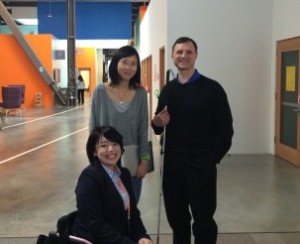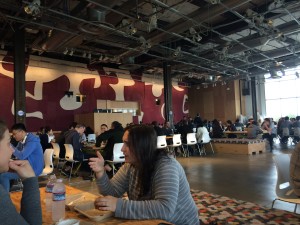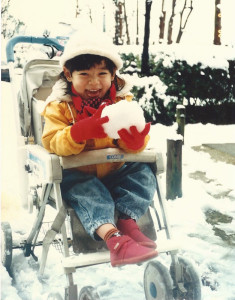This article is also available in: 日本語
Hi, it’s Mizuki!
In my Facabeek report part 1, I introduced the issues and improvement for visually impaired users of Facebook.
In Part 2, I will write tips related to my research, employment for people with disabilities.

In Japan, from April 2016, providing reasonable accommodation for people with disabilities at workplace becomes mandatory.
Companies have to provide reasonable accommodation which employees with disabilities would need to work.
Therefore I was curious and asked what kind of reasonable accommodations Matt who is blind receives here.
Then…
“Yea I do… but you know what?
The interesting thing is, at Facebook I think all people receive reasonable accommodation.
If you look around, you will find every single employee set up a desk what they want, the way they want it.
Some employees use standing desk, and some use a desk by sitting but they can adjust their preferred height.”
I was very shocked when Matt replied so, because I was thinking reasonable accommodation is just for people with disabilities.
It is true that people without disabilities also have their preferred working environment to work more comfortable and more productive.
Not to treat employees with disabilities as special, a company provides a working environment for each employee to meet his/her needs to do the job.
I realized this is an ideal situation.

The employees at Facebook come from various different background.
The management team including Mark Zuckerberg, CEO and Sheryl Sandberg, COO considers diversity as a high priority.
People with disabilities are also included. Also of course, how the company see employees are “what they can do.”
“The best way to describe my experience is that you literally are treated the same way as anybody else.
The decision to hire you, the decision to promote, the decision to include you in a project none of that is based on your disabilities.
It is based on your capability.
However, there is another challenge too.
Since a company treat people with disabilities as equal, they have to have skills and experiences that make them work with others.
Some parents who have a child with disabilities don’t know how to help the child to develop his or her ability and often keep the child in their house.
By doing so, the child won’t be able to have experiences which other kids usually do, and the child won’t receive necessary educations either.
Eventually those children themselves will face many difficulties in the future.”
Matt said.
In Japan, people with disabilities are considered as ones the society should protect.
In the U.S., however, they are considered as one who can receive general education and work at a general company (not like sheltered workshop etc.) if they can receive necessary accommodation.
Moreover the U.S. is often described as meritocracy including people with disabilities.
They can be viewed as equal which means won’t be valued if they don’t have enough abilities as other non-disabled people.
I believe Japan’s workplace for people with disabilities is becoming more like the workplaces in the U.S., which is to treat everyone as equal.
Then how parents raise their kids with disabilities is getting more important.
Kids’ future will really depend on what kind of education and experiences they had since they are little.

My parents often said to me,
“Your disability is only walking.
You can do other things, so you should try by yourself.
If you really cannot do, you should ask someone for a help by yourself because you can talk.
And if you get a help, say thank you.“
My parents had told me since I was little, so now I naturally think “I gotta try by myself first.”
And my case is not special.
I have some friends with different kinds of disabilities.
I realized that persons who challenge new things by themselves and live positively have common points, which include their parents.
Their parents push them hard and encourage them to try everything since they were kids.
Shaomei said,
“Matt has excellent skills and experiences.
When some system trouble occurred, he quickly found the cause and explained the solutions to other members.
It didn’t take time for him to gain credibility in here.
Some people without visually impairment cannot do those works Matt easily does.
After he joined the team, things are much better.”

In Japan, employers focus more on “disability” when hiring and positioning people with disabilities.
Moreover some employees with disabilities would not be able to get as same opportunities as other employees without disabilities such as training, business trip or promotion, because the employers think they cannot do it due to their disabilities.
Those employers don’t really see people with disabilities as a person who can do things, but as person who cannot do things.
Those employers hire people with disabilities in a way they can feel safer and manage easily.
Personally, an employer could receive a good return by positioning people with disabilities at places where they are interested in and can maximize their abilities, I think.
Even when hiring people with disabilities, it still costs for an interview, registering as an employee, paying monthly salary…
but if people with disabilities cannot receive necessary accommodations or are positioned to somewhere completely not related to their interests, they will leave soon with high possibility.
So it will be waste of money.
If you try to hire people with disabilities, please look at them as persons and what experience and skills they have.
Then please think how you can create an working environment for them to express their abilities you will also be one of the beneficiaries.
Everybody wins.
